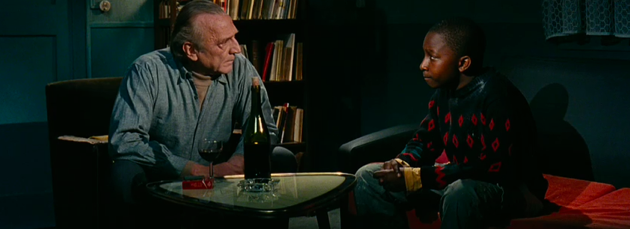Review: ‘Le Havre’

A gentle tale about friendship and love, "Le Havre" is the latest film directed by Aki Kaurismaki, as if anyone could tell this story in quite the same way as he does. The Finnish filmmaker's latest has all his trademarks -- a deadpan style, characters whose faces are notable for their permanently dour expressions -- and so this slight comedy is like art-house comfort food. You smile at its wry humor, you enjoy its good-natured characters, and then you go home, happy for the 90 minutes you devoted to the movie. There are many less worthy ways to spend your evening.
The movie stars Andre Wilms (a Kaurismaki regular) as Marcel, an old shoeshiner living in the small French town that gives the film its name. He and his wife Arletty (Kati Outinen, another Kaurismaki regular) live a modest but good life; it doesn't seem like anything particularly exciting has happened to them in years. But then two things do: She becomes ill and has to stay in the hospital, and he encounters Idrissa (first-timer Blondin Miguel), a young African immigrant trying to make his way to London who desperately doesn't want to be found out by the authorities, who want him deported. Marcel decides to help hide the boy while he worries about his ailing wife.
In films like "The Man Without a Past," Kaurismaki has proved himself to be a man who loves crafting modest modern-day fairy tales in which both the poignancy and the laughs have a sort of ethereal distance to them. With their precise compositions and quiet construction, his films are almost like little dioramas of real life that you check in on every few years. There's nothing earth-shattering going on, but they're fun to visit. "Le Havre," despite its serious themes about racial inequality, very much falls into line with the filmmaker's earlier works. But that lack of stridency is important: Kaurismaki doesn't want to pound you over the head with his message, and so Marcel's simple journey to help Idrissa is filled with chuckles and nice small moments.
Because of Kaurismaki's deadpan approach, "Le Havre" can feel awfully mannered. (You may think you've walked into a generically artsy foreign film like the ones Stella Artois parody in their commercials.) But that line between fable and reality that Kaurismaki walks helps give "Le Havre" its otherworldly charm. These people don't exactly act the way normal people do -- a police inspector (played by Jean-Pierre Darroussin) looking for Idrissa isn't quite a model of lighting-fast sleuthing skill -- but they're really not meant to. They live in a world where people are a little nicer, a little kinder to one another. All in all, the place seems pretty great.
This isn't to say that even at an hour and a half "Le Havre" doesn't still feel overstretched. Although Kaurismaki clearly sympathizes with Idrissa, he never goes beyond treating the boy as anything other than an angelic-faced symbol for the immigrant experience in Europe. And you may grow tired of Kaurismaki's chuckle-but-never-really laugh comedic style. But if your idea of a funny movie is one in which a very stern man walks into a tense location silently carrying a pineapple, "Le Havre" may just be on your wavelength.
Grade: B

